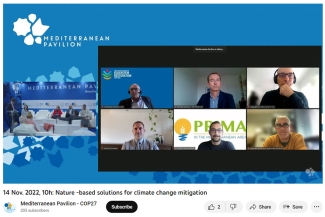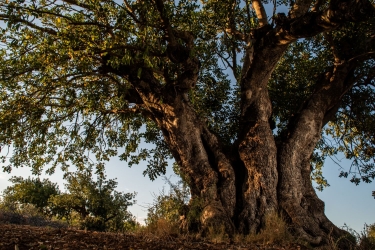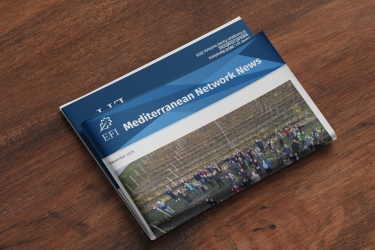The transition from knowledge to action at the heart of the discussions at COP27 Mediterranean Pavilion

The United Nations Climate Change Conference (COP27) in Sharm el-Sheikh (Egypt) is taking place from 6 to 18 November. On November 14, the European Forest Institute Mediterranean Facility (EFIMED) joined a panel session focusing on nature-based solutions for climate change mitigation, hosted in the Mediterranean Pavilion. The session was organised by the Union for the Mediterranean, the United Nations Environment Programme – Mediterranean Action Plan and the PRIMA Foundation.
This pavilion hosted many events held to highlight the pressing challenges posed by climate change in the Mediterranean region and to present innovations and solutions developed in this area to the COP27. Among these several meetings, the head of EFIMED, Michele Bozzano joined a discussion on nature-based solutions in climate change mitigation and adaptation in the Mediterranean. There, he highlighted how, in the Mediterranean, forests provide ecosystem services that are key to mitigate the effects of climate change. Understanding how to value these ecosystem services is one of the key questions of the Mediterranean Forest Research Agenda 2030 that will launch at the end of the month at the EFI Mediterranean Network Forum 2022.
However, to achieve climate change mitigation, forests need to adapt to changing conditions. Given that Mediterranean forests have been shaped by humans for thousands of years, resulting in heavily fragmented and degraded landscapes, he also explained that science-driven managerial actions are needed to restore the adaptive capacity of forests.
In a context where scientists are generating knowledge on how to make our forests resilient so that they can adapt to climate change and mitigate its effect, Dr Bozzano underlined the need to transfer this knowledge to action, the driving mission of the European Forest Institute.
Octavi Quintana, the Director of PRIMA programme Secretariat, concluded the session with a similar reflection. He emphasised the need to move from knowledge to action: innovations on policies, products or services must reach end users - decision-makers or the market - to achieve climate change mitigation.


